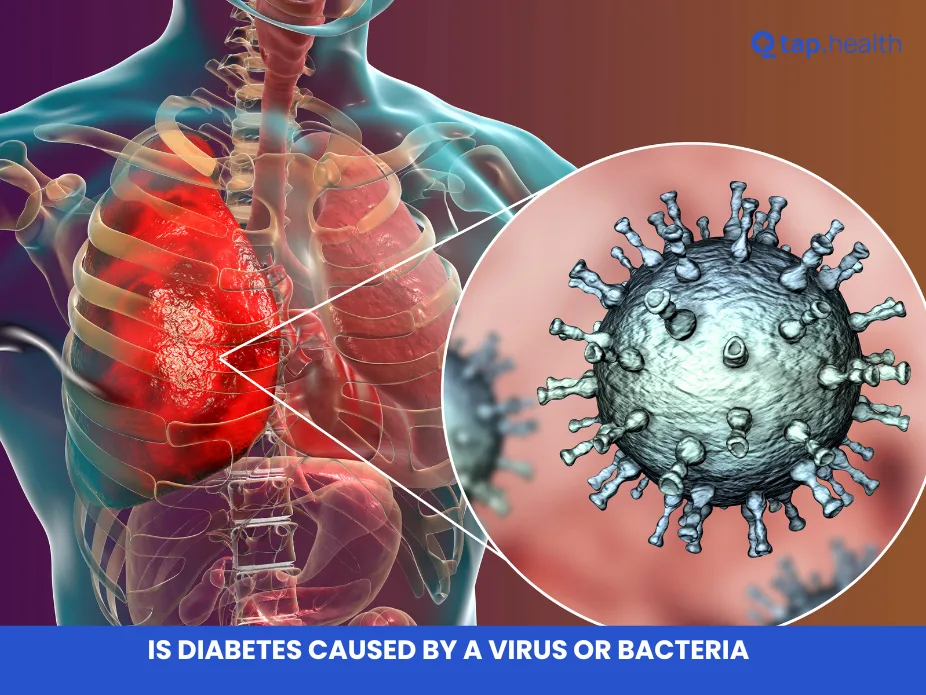Diabetes is a condition that affects millions of people around the world. If you’ve ever wondered whether diabetes could be caused by a virus or bacteria, you’re not alone. In this blog post, we will dive into this topic, exploring the facts, expert insights, and real-life examples to give you a clear understanding of what’s really going on in the body when diabetes develops.
What Is Diabetes?
Diabetes is a chronic condition that affects how your body processes glucose (sugar). There are two main types of diabetes: Type 1 and Type 2. In Type 1 diabetes, the body’s immune system attacks and destroys the insulin-producing cells in the pancreas. In Type 2 diabetes, the body doesn’t use insulin properly, which leads to high blood sugar levels.
Can Diabetes Be Caused by a Virus or Bacteria?
This is a common question, and the answer is a bit more complicated than a simple “yes” or “no.” While viruses and bacteria can play a role in triggering certain types of diabetes, the exact causes are still being researched.
Type 1 Diabetes and Viruses
For years, researchers have been investigating the connection between viruses and Type 1 diabetes. Some studies suggest that certain viral infections may trigger the immune system to attack the pancreas. In particular, the Coxsackievirus, a virus that belongs to the enterovirus family, has been linked to an increased risk of Type 1 diabetes.
When someone with a genetic predisposition to diabetes contracts a viral infection, the immune system may mistakenly target the pancreas, thinking it’s a harmful invader. This process is known as an autoimmune response.
Type 2 Diabetes and Bacteria
For Type 2 diabetes, the link between bacteria and the disease isn’t as direct as in Type 1 diabetes. However, emerging research suggests that certain bacteria in the gut may influence insulin resistance, which is a key factor in the development of Type 2 diabetes.
Researchers have found that people with an imbalance of bacteria in their gut—also known as dysbiosis—may be at higher risk of developing insulin resistance. The exact mechanism isn’t entirely clear, but gut health plays a significant role in metabolic diseases like Type 2 diabetes.
Real-Life Scenario: Ravi’s Story
Take the case of Ravi, a 28-year-old man from Mumbai. Ravi had always been healthy, but after he caught a severe viral infection during flu season, he started noticing unusual symptoms—fatigue, increased thirst, and frequent urination. After a series of tests, Ravi was diagnosed with Type 1 diabetes. His doctors believe the viral infection triggered his autoimmune response, leading to the destruction of his insulin-producing cells. Ravi’s experience shows how a virus, combined with genetic factors, can contribute to the development of diabetes.
Expert Contributions: Insights from Dr. Rani Mehta
According to Dr. Rani Mehta, a well-known endocrinologist in India, “While viruses like the Coxsackievirus have been linked to Type 1 diabetes, bacteria’s role in Type 2 diabetes is more complex. Gut health plays a significant role, but it’s still not fully understood how bacteria can trigger the disease.”
Dr. Mehta also points out that while infections may increase the risk, lifestyle factors such as diet and exercise are also crucial in managing and preventing diabetes. A balanced lifestyle can help lower the risk, even if you have a genetic predisposition.
How Do Viruses and Bacteria Affect Diabetes?
Viruses and bacteria can influence the immune system and metabolic processes in different ways:
- Viruses: Some viruses, like the Coxsackievirus, can cause an autoimmune response where the body mistakenly attacks its own cells. In Type 1 diabetes, this results in the destruction of insulin-producing cells in the pancreas.
- Bacteria: In Type 2 diabetes, the connection to bacteria is more indirect. Imbalances in gut bacteria (dysbiosis) can affect how your body processes food and glucose, contributing to insulin resistance.
Recommendations Grounded in Proven Research and Facts
If you’re concerned about the potential role of viruses or bacteria in diabetes, it’s important to focus on managing your overall health. Proven strategies include:
- Maintaining a healthy diet: Eating foods rich in fiber, fruits, vegetables, and lean proteins can help regulate blood sugar levels.
- Regular physical activity: Exercise can help your body use insulin more effectively and maintain a healthy weight.
- Monitoring your health regularly: If you have a family history of diabetes or suspect that you may be at risk, getting regular checkups can help you catch any signs early.
Additionally, understanding the link between gut health and diabetes can help. Eating foods that promote a healthy gut microbiome, such as probiotics and fiber-rich foods, can improve overall metabolic health.
For more information on how insulin affects the kidneys, check out this article on insulin and kidney health.
Prevention of Diabetes: Can You Avoid It?
While you can’t change your genetic predisposition, lifestyle changes can significantly reduce the risk of developing diabetes. Here’s what you can do to lower your risk:
- Stay Active: Regular exercise improves insulin sensitivity and helps maintain a healthy weight.
- Eat Well: A balanced diet rich in whole grains, fruits, and vegetables can help keep blood sugar levels stable.
- Manage Stress: Chronic stress can impact insulin resistance, so finding ways to relax and unwind is crucial.
Also read this : Is Besan Flour Good for Diabetes? A Comprehensive Guide
FAQ on Diabetes and Its Causes
1. Can a virus really cause diabetes?
Yes, some viruses, like the Coxsackievirus, have been linked to the onset of Type 1 diabetes. However, it usually requires a genetic predisposition for this to occur.
2. Are bacteria responsible for Type 2 diabetes?
Bacteria in the gut may contribute to insulin resistance, which is a major factor in the development of Type 2 diabetes. However, the link between gut bacteria and Type 2 diabetes is still being studied.
3. Can lifestyle changes prevent diabetes caused by a virus?
While lifestyle changes can’t prevent viruses, maintaining a healthy lifestyle can help manage diabetes and reduce the risk of complications if you already have it.
4. What should I do if I suspect I have diabetes?
If you suspect you have diabetes, it’s important to visit a healthcare provider for a diagnosis. Early detection can help prevent complications.
Conclusion
While viruses and bacteria may play a role in the development of diabetes, the full picture is still not entirely clear. Factors like genetics, lifestyle, and immune responses also contribute significantly to the risk of diabetes. By staying informed, making healthy lifestyle choices, and getting regular checkups, you can manage your risk and lead a healthier life.



